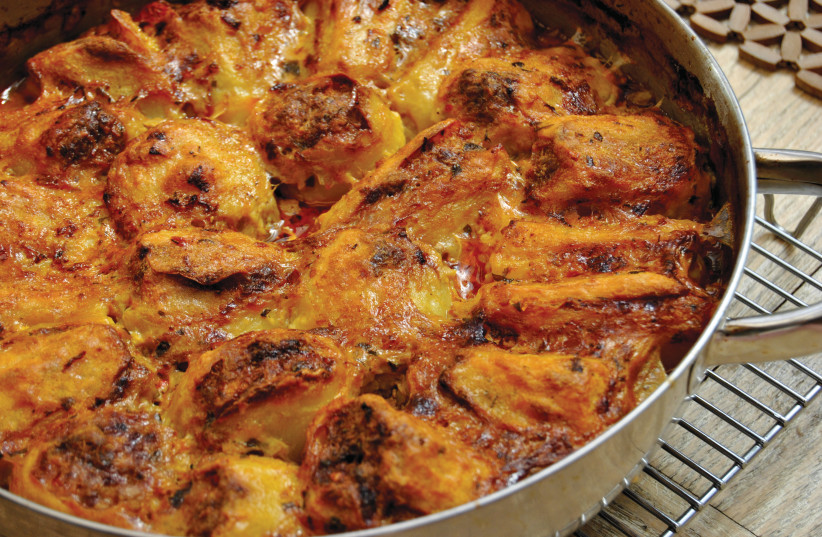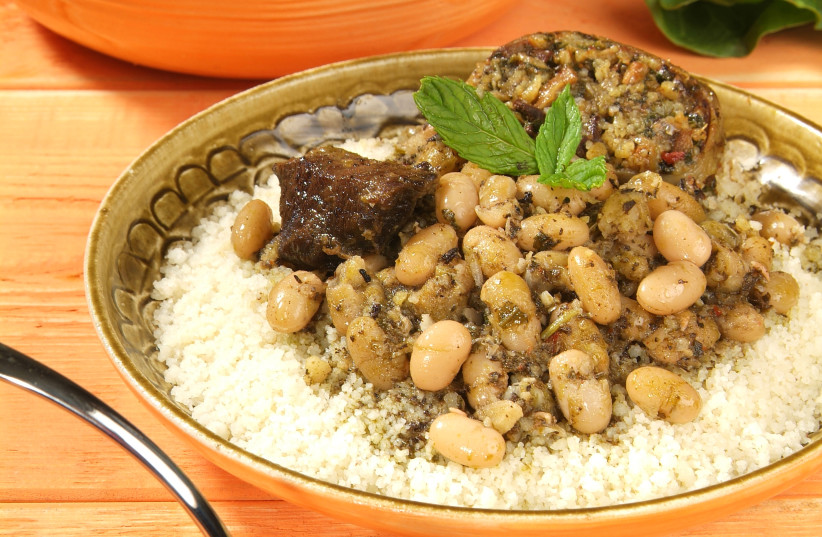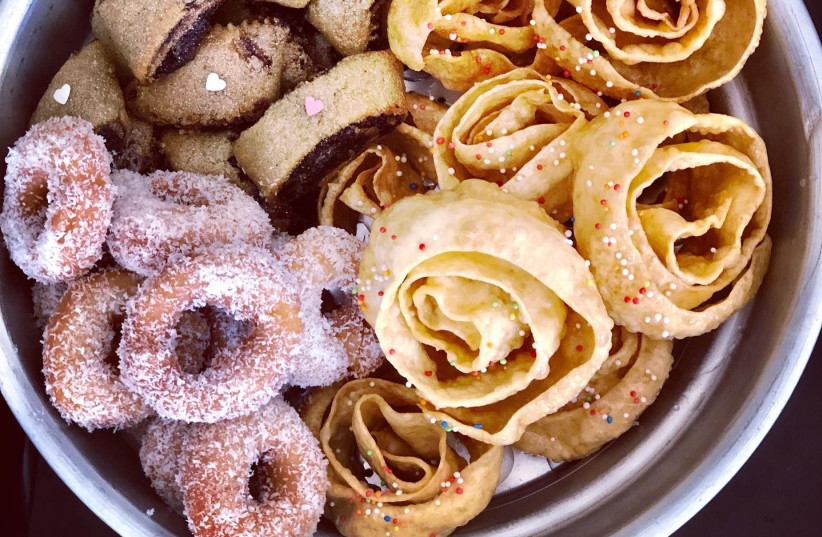Pascale’s Kitchen: A walk down memory lane

In preparation for this special meal that would take my siblings and me back down memory lane, I started making a list of all the dishes my mother would prepare for Shabbat.
It’s been more than a decade since my parents, Esther and Haim Peretz, of blessed memory, passed away. At every stage in life, I miss them.
Not a day passes that I don’t think about proverbs my father used to say in Tunisian Arabic whenever something ridiculous or surprising happened. My love for cooking began back when I was a child, and I would spend time with my mother in the kitchen. She would make everything from scratch, and almost everything we ate were dishes found in traditional Tunisian cuisine.
For more of Pascale's recipes, click here>>
A few weeks ago, after visiting their graves, I decided to express my love for them by preparing a fully authentic Tunisian festive meal, to which I invited my siblings.
Growing up, every holiday and occasion had specific foods associated with them. Every week, my parents would begin Shabbat preparations on Wednesday. My father would buy all the items we needed at the shuk in Ramle – vegetables, fruit, fish, meat and lots of other things. Then, Thursday morning my mother would begin cooking and not stop until it was time to light Shabbat candles.
So, in preparation for this special meal that would take my siblings and me back down memory lane, I started making a list of all the dishes my mother would prepare for Shabbat. I held this get-together on a Thursday night so that everyone would be able to attend. The menu included 16 salads – both cooked and fresh – including makbubu (spicy tomato and pepper); mazura (carrot); azlug (eggplant); and genariya (artichoke). I also baked the little rolls she would make to accompany the salads.
For the main course, I prepared couscous with vegetable soup and beef; muhshi (stuffed vegetables); kufta; and stuffed kishke. For dessert, I made a variety of cookies that my mother would always prepare, which I served with lemon verbena tea.
One of the strongest memories I have is the aroma of all the fresh herbs that my mother would chop. Some were for salads, others were for stuffed vegetables. She would peel the potatoes in such a fashion so that its concave shape was perfect for stuffing. She would also stuff zucchini, eggplant and pumpkin.
I loved watching her mix the herbs with the ground beef before stuffing the vegetables. Within a few minutes, she would have all the pieces lined up and ready to be dipped in flour, then in egg, and then deep fried. Did that smell good!
Next, she would place the stuffed vegetables in a bubbling pot of sauce, shaking it a little to make sure the sauce covered everything.
For dessert, I served dubaleh; makrud; and yoyo cookies, which are fried, then dipped in syrup with orange blossom water. I placed framed pictures of our parents on the table so that it would feel as if they were there, together with us. Everyone told stories, and we recounted memories and anecdotes from our childhood. We laughed, cried a bit, and even sang a few songs. In short, the meal was a huge success.
Below, you will find a few of the recipes for the dishes I made for that memorable evening.
Muhshi (stuffed vegetables with couscous)
Makes 7-8 servings.
- 3 large onions, chopped and soaked in water
- 15 sprigs of parsley, chopped and soaked in water
- 3 sprigs of cilantro, chopped and soaked in water
- 2 slices of bread, soaked in water, then drained well
- 400 gr. beef, ground of finely chopped
- 1 tomato
- 2 eggs
- ½ Tbsp. harissa or spicy paprika
- ½ tsp. pepper
- ½ tsp. turmeric
- ½ tsp. salt
- 5 cloves of garlic, crushed
Filling:
- ½ large eggplant
- 100 gr. pumpkin
- 1 light green zucchini
- 2 potatoes
- 2-3 spicy green peppers
Frying:
- 1 egg, beaten
- 1½ cups flour, sifted
- 1½ cups oil for frying
Vegetables:
- 2 Tbsp. oil
- 2 medium tomatoes, cut into pieces
- ½ turnip, cut into pieces
- 1 medium onion, finely chopped
- 5 sprigs of parsley, finely chopped
- 5 cloves of garlic, crushed
- Salt and pepper, to taste
- ½ tsp. turmeric
- 1 tsp. harissa or spicy paprika
- 2-3 cups water, to cover
Drain the onion, parsley and cilantro, then place them in a bowl. Add the drained bread, beef, tomatoes, eggs, garlic and spices. Mix well.
To prepare the filling:
Peel and rinse the vegetables. Slice the eggplant in half laterally. Slice each half with slices that do not go all the way to the end so that it remains one unit. Slice the zucchini and pumpkin in the same fashion.
Peel the potatoes into a long strip that keeps circling around the potato, in the same way that you would peel an orange. Then, slice the strips into pieces so they can be filled. Cut off the top of the pepper and remove all the pith and seeds, then slice in half.
Take some of the filling and stuff it into the strips of potato and the rest of the vegetables that were hollowed out. Arrange the stuffed vegetables on a serving platter.
Place the flour in one bowl. In a second bowl, beat the egg with 2 tablespoons of water. Heat the oil in a large pan. Roll the stuffed vegetables in the flour, then dunk them into the beaten egg. Fry them on both sides in the hot oil until they turn golden brown. Remove them, and place on paper towels or in a strainer.
To prepare the vegetables:
Heat the oil in a large, flat pan. Add all the vegetables and sauté them for 2-3 minutes. Add the spices, harissa and water, then stir. Bring to a boil. Arrange the stuffed vegetables on top of the sauted vegetables so they touch each other, like roof tiles. Shake the pot a little so that the sauce covers the stuffed vegetables, then cover the pot. Cook for 50 minutes over medium-low heat.
Level of difficulty: MediumTime: 2.5-3 hoursStatus: Meat
Bikeila (Swiss chard stew)
Makes 6-8 servings.
- 6 Tbsp. Swiss chard puree (for purchase in specialty stores in Netanya, Or Yehudah and Ramle)
- ½ tsp. spicy paprika
- ½ tsp. pepper
- 2 chili peppers or 2 Tbsp. harissa
- 2 cinnamon sticks
- 10 cloves of garlic, crushed
- ½ tsp. salt
- ½ kg. beef, cut into large pieces, rinsed and drained
- 5 cups water
- 3 cups dry white beans, soaked in water overnight, rinsed and drained
- 6-8 eggs, rinsed
Place the Swiss chard puree in a large pot and sauté for 2-3 minutes. Next, add the spicy paprika, pepper, chili peppers, cinnamon, garlic and salt. Mix, then add the beef and sauté for 5-7 minutes. Add 4 cups of water, stir and cover the pot.
Bring to a boil, then add the beans and eggs. Pour in the rest of the water, cover and cook for 30 minutes over low heat. Check every once in a while to make sure there is enough liquid left. If necessary, add up to 1 more cup of water. Place the pot on an electric plata and let it cook overnight. If it’s too dry, you can add up to another ½ cup of water. Remove the cinnamon sticks and serve.
Level of difficulty: Medium-hardTime: 2 hours (plus time cooking on plata)Status: Meat
Yoyo cookies in syrup
Makes 30 medium cookies or 40 small cookies.
- 2 large eggs
- 2/3 cup (120 ml.) fresh orange juice
- ½ cup (100 ml.) canola oil
- ½ cup (100 gr.) sugar
- 2-3 drops vanilla extract
- 3½ cups + 1 Tbsp. (450 gr.) flour, sifted
- 1½ packets (15 gr.) baking powder
- Oil for frying
- Syrup with 1-2 drops orange blossom water
Toppings:
- Coconut flakes
- Pistachios, chopped
Add the eggs, orange juice, oil and sugar to the bowl of an electric mixer fitted with a flat beater attachment and mix for 2-3 minutes.
Lower the speed and gradually add the vanilla, flour and baking powder. Mix until the dough becomes a little sticky. If it’s too sticky, you can add another 1-2 tablespoons of flour. Do not over-mix. Put the dough in the fridge for 30 minutes. Take a bit of the dough and roll it out into a log, then press the ends together to make a ring. Continue making rings until you’ve used up all the dough.
Heat the oil in a pan over high heat. Once it is hot, lower the heat to medium and fry a few of the dough rings on both sides until they turn golden brown. Remove and place them on paper towels. Next, dip them in the syrup, then sprinkle coconut flakes or pistachios on top of them.
Level of difficulty: MediumTime: 1 hourStatus: Parve
Translated by Hannah Hochner.
Jerusalem Post Store
`; document.getElementById("linkPremium").innerHTML = cont; var divWithLink = document.getElementById("premium-link"); if (divWithLink !== null && divWithLink !== 'undefined') { divWithLink.style.border = "solid 1px #cb0f3e"; divWithLink.style.textAlign = "center"; divWithLink.style.marginBottom = "15px"; divWithLink.style.marginTop = "15px"; divWithLink.style.width = "100%"; divWithLink.style.backgroundColor = "#122952"; divWithLink.style.color = "#ffffff"; divWithLink.style.lineHeight = "1.5"; } } (function (v, i) { });



